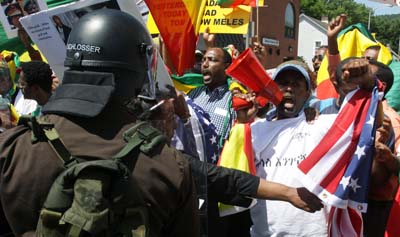Two members of the U.S. Congress, a Republican and a Democrat, have publicly voiced indignation at Ethiopia’s persecution of journalists under the leadership of Prime Minister Meles Zenawi, with both declaring that stability and security are enhanced by press freedom.
Sen. Mark Begich, an Alaska Democrat, published a statement Monday in the Congressional Record, the official daily journal of the U.S Congress, following the Camp David G8 Summit last weekend during which President Barack Obama convened four African leaders, including Meles of Ethiopia, for talks on food security in Africa.
In a letter to Obama, CPJ urged the president to engage Meles on ending Ethiopian censorship practices–such as suppressing independent reporting and denying media access to sensitive areas–that undermine international responses to food crises.
“I want to take this opportunity to address the necessity for the United States to help foster stable and democratic nations as partners as we build multilateral coalitions to tackle global issues,” Begich said in his statement. Ethiopia is a key partner of the United States in counterterrorism and regional stability and a major recipient of U.S. humanitarian assistance. Recalling Obama’s 2011 commitment to a G8 declaration on democracy, Begich declared that “as the events in North Africa and the Middle East have shown, supporting reliable autocrats who are helpful on matters of security and economics at the expense of human dignity, basic democratic rights, and access to economic opportunity is more perilous than ever to long-term U.S. national security interests.”
Begich called for the end of the persecution of independent journalists and dissidents rounded up in Ethiopia in the wake of the Arab Spring. “To foster the benefits of a diverse citizenry, the many political prisoners and journalists should be released,” he said. The senator urged colleagues in the U.S. Congress to join him in helping the citizens and government of the Horn of Africa country achieve a national consensus on the value of the free flow of information and make press freedom, as outlined in Ethiopia’s constitution, a reality. “Such are hallmarks of inclusive and sustainable economic growth, and they provide a return of accountability and transparency to both American taxpayers and Ethiopian citizens,” he added.
On Friday, Rep. Edward Royce sent a public letter to Meles in which he expressed “deep concern with the Republic of Ethiopia’s disregard for press freedom.” Royce, a California Republican who chairs a House subcommittee on terrorism, said “national security must not cripple press freedom.” Expressing concern over the prosecution of 11 journalists on terror charges, Royce said that “the judicial process clearly fails to meet international standards,” citing as an example the government’s use of national public media to pressure the courts.
Over the weekend, hundreds of Ethiopian expats gathered near Camp David to protest the country’s slide into authoritarianism, according to news reports. Washington is home to one of the largest Ethiopian diaspora communities in the world, a population that includes three Ethiopian journalists charged in absentia with terrorism in relation to their work, according to CPJ research. A fourth journalist, now languishing in a prison in the Ethiopian capital, Addis Ababa, was educated in the Washington area before returning to Ethiopia and launching one of the country’s first independent newspapers. The former editor of another independent Ethiopian paper also lives in Washington after fleeing his homeland in the face of government intimidation.
